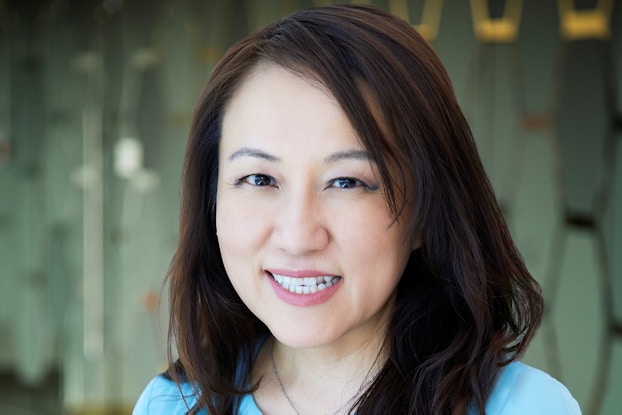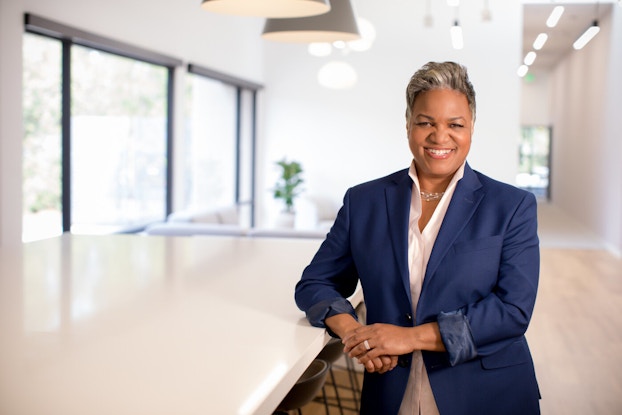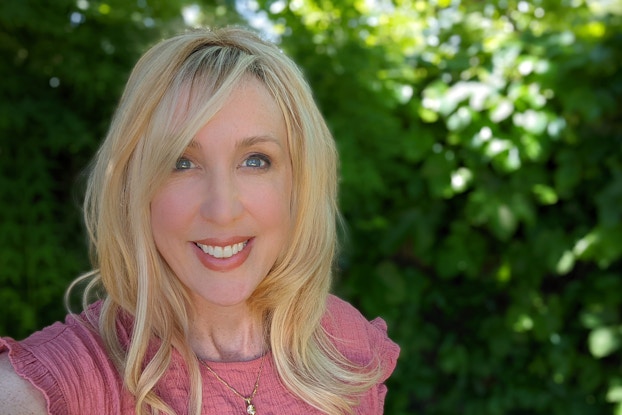Why it matters:
- Harvard defines “imposter syndrome” as doubting one’s abilities and feeling like a fraud.
- Imposter syndrome disproportionately strikes high-achieving people who struggle to accept their accomplishments.
- It hits women particularly hard: 75% of executive women have experienced imposter syndrome at points in their career.
In March 2022, Angela Hsu stepped into her first C-suite role as Chief Marketing Officer of $1.95 billion retailer Overstock.com.
The role marked a new chapter in a three-decade long career that began at Warner Brothers, where she rose through the ranks from Management Trainee to Director of Corporate Business Development in four years.
Hsu has sustained professional success by several objective measures, but no matter: Imposter syndrome, which Harvard defines as doubting one’s abilities and feeling like a fraud, still manages to cloud her mental sky.
Hsu immigrated to the U.S. from Taiwan when she was 16 and spoke barely any English. “Because English is not my first language, I always think I’m not smart enough, so I have to work extra hard to compensate for that to balance everything out,” she told CO—.
This she shared moments after headlining the opening keynote session at February’s eTail West retail conference, where an audience of 700 industry peers turned up to hear her discuss the massive rebranding campaign she’d spearheaded at Overstock over the past year.
For a trio of women executives, imposter syndrome, which disproportionately affects high achievers, rears its ugly head as a felt sense of unbelonging in professional spaces long reserved for males and frequently off-limits to people of color, according to interviews with Hsu, Rosanna Durruthy, Vice President of Global Diversity, Inclusion and Belonging for LinkedIn, and Xanthe Wells, Pinterest's Vice President, Creative Director.
They described an outsized self-doubt that belies their professional abilities and achievements and prompts “a kind of questioning: ‘Will they accept my message? Am I good enough, strong enough, smart enough?’” said Durruthy.
Looking back at moments throughout their careers, imposter syndrome has found these women in perpetual prove-myself mode, overpreparing for meetings and presentations to quell the fear of underperforming, while sometimes caving to gender stereotypes to gain acceptance and fit in, they told CO—.
Imposter syndrome disproportionately strikes high-achieving people who struggle to accept their accomplishments.
It hits women particularly hard.
According to a KPMP survey, 75% of executive women have experienced imposter syndrome at points in their career.
While there are no easy answers to countering it, recognizing when feelings of fraud bubble up, taking stock of one’s professional successes, and remembering that your authentic self will always be enough can be powerful antidotes, interviewees said.
“Review your own accomplishments — women are taught that’s an ego driven thing,” but it’s not, Pinterest’s Wells said.
[Read: Execs From Hershey’s to Microsoft Reveal Their Mentors’ Best Advice]

‘My mom would say, ‘Do a good job and make sure your boss likes you’
Angela Hsu, Chief Marketing Officer, Overstock.com
For 56% of women executives, a range of external factors stir fears that they’ll fall short of performance expectations. Hsu is one of them.
Fear fostered a work — and overwork — ethic that started early on. A year after immigrating from Taiwan, Hsu earned a perfect score on the math portion of her SAT test. In her first career job at Warner Brothers, she assumed a relentless travel schedule, hitting 40 countries as the company expanded its studio stores worldwide. “I remember the two executives I traveled with said I was the hardest worker at Warner Brothers,” she said.
But Hsu’s mindset, in part ingrained by family expectations, also tamped down her own career expectations and aspirations. "My mom would say, ‘Do a good job and make sure your boss likes you; don’t worry too much about pay. As a minority, it might not be as easy [taking on a new role],” she recalled.
It’s in part why Hsu stayed at Lamps Plus —where she helped build the lighting company’s e-commerce business from the ground up — for 19 years. Lacking the confidence to know her value, she wondered, “’Am I going to do better? [Is the next company] going to value me as much?’”
For years, Hsu rebuffed job inquiries from executive recruiters. Then the pandemic hit, and she found herself updating her resume.
When the Overstock CMO opportunity arose, “I thought, ‘I can do it.’ I knew so much more than I thought. I could add value,” she said.
For Hsu, it’s not a question of countering the narrative of imposter syndrome. It’s about living with it.
She was recently reminded of a statistic that “not many Asian women make it to the C-suite,” Hsu said. “When I heard that, I thought, ‘I guess I should be proud.’”

Accomplishment ‘doesn’t disappear imposter syndrome’
Rosanna Durruthy, VP of Global DEI, LinkedIn
A lifelong overachiever, LinkedIn’s Durruthy skipped two grades and entered Harvard as a 16-year-old freshman.
She’s since gained a reputation as one of the nation’s leading professional Hispanic women and an influential thought leader in the DEI space, serving top diversity posts at companies including Cigna, Vivendi, and now LinkedIn.
But accomplishment, she said, “doesn’t disappear imposter syndrome.”
At the outset of her career, “I was often the youngest person, only person of color, only Latina or Black woman, and, when I came out, the only lesbian in the room,” Durruthy told CO—.
She struggled to feel seen in professional spaces, so she coped by playing a role of sorts. “I felt that I had to pretend to be someone else in order to be accepted by others. I worked to be seen as one of the guys in the room,” she said, as “I was invisible to them.”
Although Durruthy genuinely loved sports, she “doubly prepared” on Monday morning to talk with co-workers about the big game the night before.
Like Hsu, imposter syndrome triggered “the anxiety to overprepare,” she said. “I can’t tell you all the all-nighters I pulled to prepare when I was already fully prepared before all the all-nighters.”
Professional success is a journey, and often we don’t take the time to own our achievements.Rosanna Durruthy, Vice President of Global Diversity, Inclusion and Belonging, LinkedIn
For Durruthy, relief has come from leaning into her authentic self — which “requires the intentionality of recognizing when imposter syndrome shows up; acknowledging that you’re OK; and choosing to be yourself,” she said. “Professional success is a journey, and often we don’t take the time to own our achievements.”
She invoked insight from former LinkedIn CEO Jeff Weiner as a kind of grounding wisdom when imposter syndrome surfaces: Be conscious that what we believe isn’t always true and “be a spectator to our own thoughts,” Durruthy said. “We can get trapped in our opinions and our beliefs,” which often cloud reality.
Durruthy’s experience has energized her to “create safe spaces” for others, which can be a powerful antidote to imposter syndrome, she said. Integral to that mission is building diverse teams “that can learn from each other,” and mentoring others.
“Creating psychological safety for others, acknowledging them and recognizing them, may seem like a small thing but it feels like the biggest success I’ve created as a leader,” she said. “To be able to walk the world and allow people to see themselves in you and allow them to feel seen, I personally not only get tremendous energy from it that’s humbling, but it’s also consistent with, ‘How do I make a difference in the world? How do I help others reach their full potential?’”

‘People thought I was a sweet young girl, so how could I also be a creative thinker?’
Xanthe Wells, VP of Creative, Pinterest
Imposter syndrome doesn’t resonate with Pinterest’s Wells, who was one of Ad Age’s "Women to Watch" and Business Insider’s "30 Most Creative Women in Advertising,” in how it’s generally understood.
That’s because her two-decade-long career as a creative director naturally flows from Well’s singular pursuit of a life in the arts since age 4. It’s that organic link between the personal and the professional that’s cushioned her from the feelings of fraud central to imposter syndrome, she told CO—.
But while Wells has never doubted her bona fides as a creative director, others routinely have, since she didn’t fit their “male creative genius” idea of one, she said.
That disconnect between inner belief and colleagues’ bias-informed disbelief found Wells earlier in her career sublimating her personal style to gain acceptance in a male-dominated field.
“I’ve known what I’ve wanted to do ever since I was a little kid but been doubted every time I’ve walked into a room,” she said. “No matter how much I’ve accomplished, I’m still a blonde woman who doesn’t look like a creative director. People thought I was a sweet young girl, so how can I also be a creative thinker?”
During her ad agency years, Wells was relegated to working on women-only brands. “I literally wasn’t allowed on one of the biggest soda accounts,” she said.
So to fit in, she mimicked “the stereotype of leadership I was seeing. The type of guy with a lot of bravado… I tried to come across that way, wore track suits, and spoke loudly,” she said. “Why wouldn’t I act like a guy to get on the best piece of business?” she said.
Years of experience and societal shifts have since freed Wells to show up at work as simply herself.
“In the last couple of years, there’s been so much in the culture about showing up as oneself at work, so in some ways, I finally have full permission, and I’m at a place in my career where there isn't a big question mark about my ability,” she said.
“Now I wear pink dresses and curl my hair and wear lipstick and do all the things that are super girly, but I still have a pretty big creative job.”
‘When you don’t have the ability to adapt, imposter syndrome is really profound’
Wells, Hsu, and Durruthy each expressed an ongoing appetite for professional knowledge and are eager, perpetual students of the business landscape.
“I’m always doing the learning and always building the new skill,” said Durruthy, which sometimes means “allowing the next generation to mentor me because the world is changing so rapidly,” she said. “When you don’t have the ability to adapt, imposter syndrome is really profound. There is certainly no shame in asking for help.”
Wells finds it freeing to share with others what she doesn’t know. “I tell people, ‘This is not in my wheelhouse; I want to learn this,’” she said. “Sometimes I’ll say, ‘Even though I have this big title, I’m a junior in this area.’”
Hsu, meanwhile, is constantly studying market dynamics, startup trends, and soaking up industry conferences “to keep myself sharp,” she said. “I’m always very curious.”
CO— aims to bring you inspiration from leading respected experts. However, before making any business decision, you should consult a professional who can advise you based on your individual situation.
CO—is committed to helping you start, run and grow your small business. Learn more about the benefits of small business membership in the U.S. Chamber of Commerce, here.









